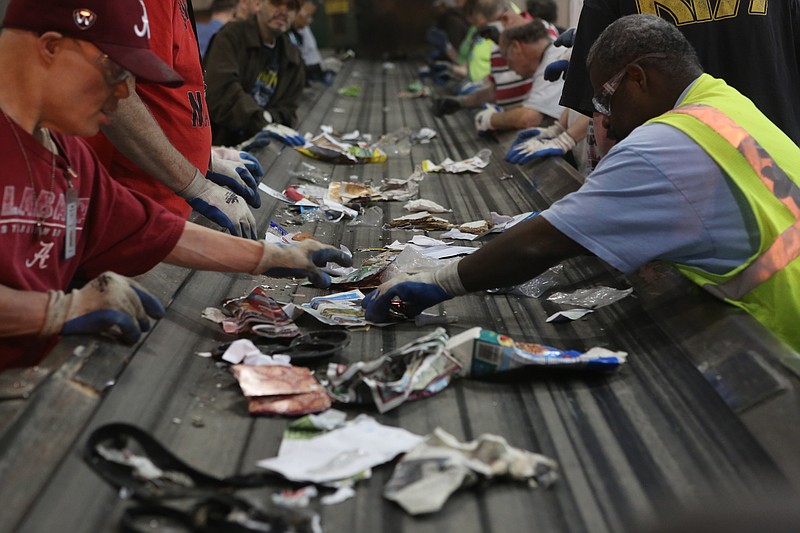Read more
Glass 'recycled' in curbside bins actually goes to landfill
A number of Chattanoogans and area residents were taken by surprise last week to learn that at least some, maybe much, of the glass tossed into curbside bins here winds up in the landfill.
The news seemed especially shattering to Chattanoogans who have zealously taken to recycling since September when the city again fully embraced curbside recycling using the city's new 96-gallon blue containers instead of just traditional trash cans.
But local outrage by recycling zealots, while appreciated, may be a bit misplaced. And premature, too.
First - there's new machinery coming, and city officials thought it wiser not to confuse new recycling habits with on-again-off-again instructions. More on the future in a bit.
Second - The landfilled curbside glass is but a small portion of the city's recycled glass. While it is correct that glass broken into small pieces along the rough-and-tumble collection process of curbside recycling now often ends up in the landfill, most of the glass recycled by Orange Grove is presorted and delivered from county and city recycling stations and from restaurants and bars whose employees sort glass for Orange Grove's Recycle Express for Business program.
"Eighty to 90 percent of glass that comes into Orange Grove is recycled. That's because most of glass comes to us from other than single-stream curbside service," says Heidi Hoffecker, Orange Grove Center's director of development.
That's a crystal clear plus for Chattanooga - especially when you consider national glass recycling numbers: Americans generated 11.5 million tons of glass in the municipal solid waste stream in 2013, according to the U.S. Environmental Protection Agency. Only about 27 percent of the glass was recovered for recycling, according to the EPA.
In Chattanooga, more glass from the curbside bins can be recycled if folks will push our various governments or themselves to help Orange Grove raise the remaining half of $1.6 million needed to buy and install new recycling sorting equipment. The equipment - which the center hopes to install by the end of the year - would let glass, which is heavier than other recycled materials, fall out of the mix on conveyor belts before Orange Grove's workers with disabilities begin the hands-on job of sorting our convenient-for-us, single-stream recyclables.
So far, the center has gotten pledges for $780,000, including $250,000 from the city of Chattanooga, $250,000 from the Lyndhurst Foundation and most of the remainder from two other foundations that wish not to be identified.
The Hamilton County Commission turned down Orange Grove's request for $250,000.
But since the Aug. 14 Times Free Press story appeared about much of the glass from the single-stream recyclables going to the landfill, Hamilton County's District 1 Commissioner Randy Fairbanks has pledged $10,000 of his discretionary money toward the equipment, Hoffecker said Thursday.
Let's make the math easy. Our county has nine commissioners. If the other eight chimed in to match Fairbanks, Orange Grove would move closer to having all the money for the recycling center's first significant upgrade in 27 years. And it's important to note here that Orange Grove is a private, nonprofit organization founded in 1953 to help adults and children with intellectual disabilities learn and have meaningful jobs. The sorting of recyclables there is one of those employment efforts, providing paychecks for about 150 of the 400 adults helped by Orange Grove.
But there's a bigger recycling picture to consider. One of the reasons only 27 percent of glass is recycled nationally is because glass recycling to date has generally not been profitable. (Orange Grove's presorted glass in bunkers currently sells for $9 a ton. City officials says shipping fees often make the sale turn to a loss.)
WestRock, formerly RockTenn, already has machinery that sorts the glass out of the mix of recyclables for single-stream systems like those on Signal Mountain and in East Ridge. But WestRock's Mike Fitzgerald told Times Free Press reporter Tim Omarzu that his company can't sell glass - especially glass broken in single-stream systems - profitably.
"We're having a tough time getting rid of it," Fitzgerald said. So the crushed glass goes to the landfill.
What can residents do? There's a short-term answer and a long-term answer, according to Orange Grove's Hoffecker.
"Write us a check," she said, so the center can get new sorting machinery up and running.
Her longer-term answer is harder. It requires us to think and to change lifelong habits.
"We don't get to consume everything with reckless abandon and then think it's going to be OK because we recycle at the end," she said. "The first two sides of the triangle are 'reduce' and 'reuse' - the third one is 'recycle.' "
